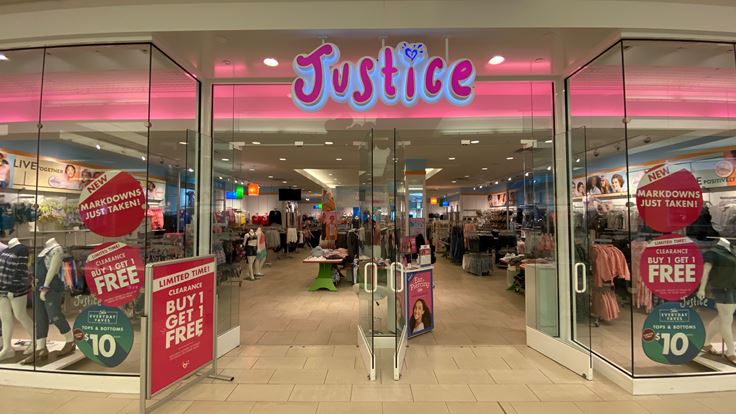
Failed Retailers’ Names Recast for Ecommerce
As the Justice retail brand comes up for a bankruptcy court auction this week, it will join a growing list of retail nameplates that are shifting under new owners from physical stores to being used as pure ecommerce sites or, in some cases, for licensed products.
Buying the brand
Brand management firm Bluestar Alliance made a $60 million stalking horse bid to buy Justice out of Ascena Retail Group’s bankruptcy, an acquisition that includes not only the brand and domain name, but also supplier and customer lists and purchase data. Bluestar has no plans to operate Justice stores, the last 86 of which – it was once a 1,000-store chain – are closing. The auction is set for today (Wednesday) in U.S. Bankruptcy Court, Richmond, VA, with a final hearing on the sale scheduled next week.
To be sure, some struggling retailers are being bought with the idea of maintaining their brick-and-mortar presence, as Authentic Brands Group has done via joint ventures, involving such chains as Aeropostale and Forever 21. Marquee Brands – with joint venture partner CSC Generation – recently bought Sur la Table out of bankruptcy, with plans to reinvigorate its omnichannel business and maintain a minimum of 50 brick-and-mortar stores.
‘Melting ice cubes’
But the path to specialty eCommerce retailer is becoming more common. “These retail brands are melting ice cubes, so the sooner you reintroduce them to the consumer, the better, so that they are still fresh in consumers’ minds,” says Ramez Toubassy, CEO at the recently formed Spotlight Brands, and who earlier helped Gordon Brothers relaunch Wet Seal as an ecommerce business. “It comes down to the consumer relationship with the retail brand and whether they have a real loyalty and affinity to it.”
The notion that retail brands – not just their operations — have value separate from the companies themselves isn’t new. Circuit City, Linens ‘N Things and The Limited lived on as licensed brands long after the last of their stores closed. But the ability to refashion them as ecommerce sites relatively quickly while the customer base and brand name remain relevant has changed the game.
So has the pandemic.
“I think this was inevitable, but we just jumped forward to what the world would have looked at in 2028” at retail, says Tai Lopez, Co-Founder and Executive Director of Retail Ecommerce Ventures. “I starting looking at these types of acquisitions in 2013, but the… prices were high, so we have sat out on purpose for the last 3-4 years. Pre-COVID we started seeing cracks in the [retail] industry, so that the prices came down and we started scooping brands up much more quickly.”
Not only are more of them available for relatively low upfront cost – Retail Ecommerce Ventures bought Modell’s IP for $3.6 million – but the sharp increase in consumers buying online during the global pandemic has widened the playing field.
Retail Ecommerce Ventures was formed last year, and has snapped up names such as Modell’s, Dress Barn, Linens ‘N Things and Pier One brands and relaunched as them as ecommerce businesses. Its principals also are involved in bidding for the IP related to bankrupt Stein Mart.
They’re not alone. Go Global Retail , for example, bought the fashion brand ModCloth from Walmart, has revamped its ecommerce business and shut down its brick-and-mortar FitShops.

















